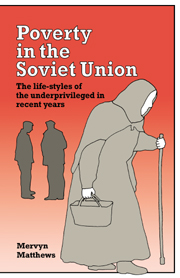Book contents
- Frontmatter
- Contents
- Preface
- PART I
- PART II
- 4 POVERTY LIFE-STYLES: OTHER ASPECTS
- 5 WORK AND SOCIAL SECURITY
- 6 POVERTY, POLITICS AND CHARITY
- 7 SOME FURTHER DIMENSIONS
- Postscript: Twelve theses on Soviet poverty
- Appendix 1 Samizdat and other unofficial documents
- Appendix 2 The emigre survey
- Notes
- Bibliography
- Index
6 - POVERTY, POLITICS AND CHARITY
from PART II
Published online by Cambridge University Press: 30 October 2009
- Frontmatter
- Contents
- Preface
- PART I
- PART II
- 4 POVERTY LIFE-STYLES: OTHER ASPECTS
- 5 WORK AND SOCIAL SECURITY
- 6 POVERTY, POLITICS AND CHARITY
- 7 SOME FURTHER DIMENSIONS
- Postscript: Twelve theses on Soviet poverty
- Appendix 1 Samizdat and other unofficial documents
- Appendix 2 The emigre survey
- Notes
- Bibliography
- Index
Summary
In pluralist societies the problem of poverty is usually the focus of much comment and political activity. This takes the form of national debate about economic policies and efforts on the part of the government to raise living standards, protect the interests of the poor, and ensure a ‘fair’ distribution of goods and services. Political parties may monitor the well-being of the least privileged groups in society, and espouse their cause.
The matter is not, however, dealt with only at a government or party level. Trade unions endeavour, through collective bargaining or other means, to obtain the best possible wage rates for all their members, including the poorest. Major churches may have poverty alleviation programmes. Other voluntary organisations, large or small, may play an important charitable role, enjoying financial support from local authorities or the central government itself. A recent US handbook of voluntary associations, for example, listed some 1,300 concerned primarily with social welfare, and many more with peripheral involvement. According to US official sources, in 1981 some $54.1 billion were donated to various types of charity, in great part by private individuals. The War on Poverty Program of 1964 was an example of massive support through US government funding. In the UK a comparable directory of voluntary effort contained about 1,000 entries, and a large proportion of the organisations named were directly involved in researching poverty or fighting it. A Low Pay Unit, founded by the government in 1974, provided ‘information and background data for independent members of wage councils, briefings for MPs, trade unionists …’, reported to ‘relevant bodies of individuals’, and provided ‘an advisory service for the general public’.
- Type
- Chapter
- Information
- Poverty in the Soviet UnionThe life-styles of the underprivileged in recent years, pp. 126 - 147Publisher: Cambridge University PressPrint publication year: 1986



